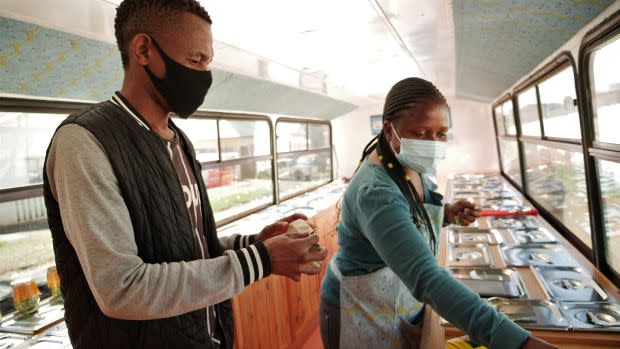What’s behind South Africa’s shocking unemployment numbers

Unemployment in South Africa, one of the biggest economies on the continent, has hit record levels, with young people and women the hardest hit.
The new data reveal that about 7.8 million South Africans were out of a job in the second quarter of this year, the highest rate since 2008, according to Statistics South Africa (StatsSA) data released Tuesday. The unemployment rate now stands at a record high of 34.4%, one of the highest levels in the world, according to a Bloomberg analysis.
Black African women are the most effected, with an unemployment rate of 41%, the agency reports. Young people aged 15-24, and 25-34, recorded the highest unemployment rates of 64.4% and 42.9% respectively, according to the data from StatsSA.
Sustained economic disruption from Covid-19, austerity measures, persistent inequality, and poor government policies have all been cited as contributors to the weak numbers. South Africa’s inflows of foreign investment, a key enabler in employment prospects, also declined by 39% to $3.1 billion in 2020.
Yet the data do not cover a recent wave of unrest following the arrest of former president Jacob Zuma, which culminated in the destruction of infrastructure and as many as 276 deaths. Some of the 40,000 affected businesses may find it difficult to come back into operation, creating an even more grim outlook.
Frustration builds over South African inequality
A highly industrialized economy in the region, the news of unemployment is highlighting the stark inequalities afflicting South Africa.
A recent report by World Inequality Lab, and cited by Bloomberg in its analysis, noted that “the top 1% richest South Africans own more than 55% of wealth” while “the poorest 90% only own 14%.” Frustrations have been building as a result.
To arrest this worsening trend and bleak outlook, pro-business reforms are urgently needed, suggests Johannesburg-based Chiedza Madzima, head of operational risk research at Fitch Solutions.
Madzima believes South Africa’s high youth unemployment is a disaster in the making. About 3.4 million, or 33%, or South Africans aged 15-24 years “were not in employment, education or training” during the period under review.
“Poverty, weak income prospects for youth, inequality and joblessness will drive recurrent bouts of social unrest and will see more calls for social welfare support,” Madzima said.
A group of young entrepreneurs in South Africa have stressed that the latest unemployment statistics for the country “suggests a lack of effective policy interventions” on the part of government.
“To date, policies that have been implemented have largely been supply-side initiatives aimed as structural causes of unemployment. It is about time that this administration sees that it is failing young people and South Africans in general,” said Sello Malinga, president of the Youth in Business South Africa.
South Africa’s biggest labor union, the Confederation of South Africa Trade Unions (COSATU), blames the sharp rise in unemployment on economic “stagnation” resulting from austerity measures.
President Cyril Ramaphosa’s administration is now considering converting a $24 Covid-19 grant into a basic income one to ease the pressure. The grant would benefit about 9.5 million unemployed citizens. Around a third of the country already depends on social grants as one of their main sources of income.
Sign up to the Quartz Africa Weekly Brief here for news and analysis on African business, tech, and innovation in your inbox.
Sign up for the Quartz Daily Brief, our free daily newsletter with the world’s most important and interesting news.
More stories from Quartz:
The Pfizer vaccine’s brand name, Comirnaty, is weird for a reason
Psychologists say a good life doesn’t have to be happy, or even meaningful
